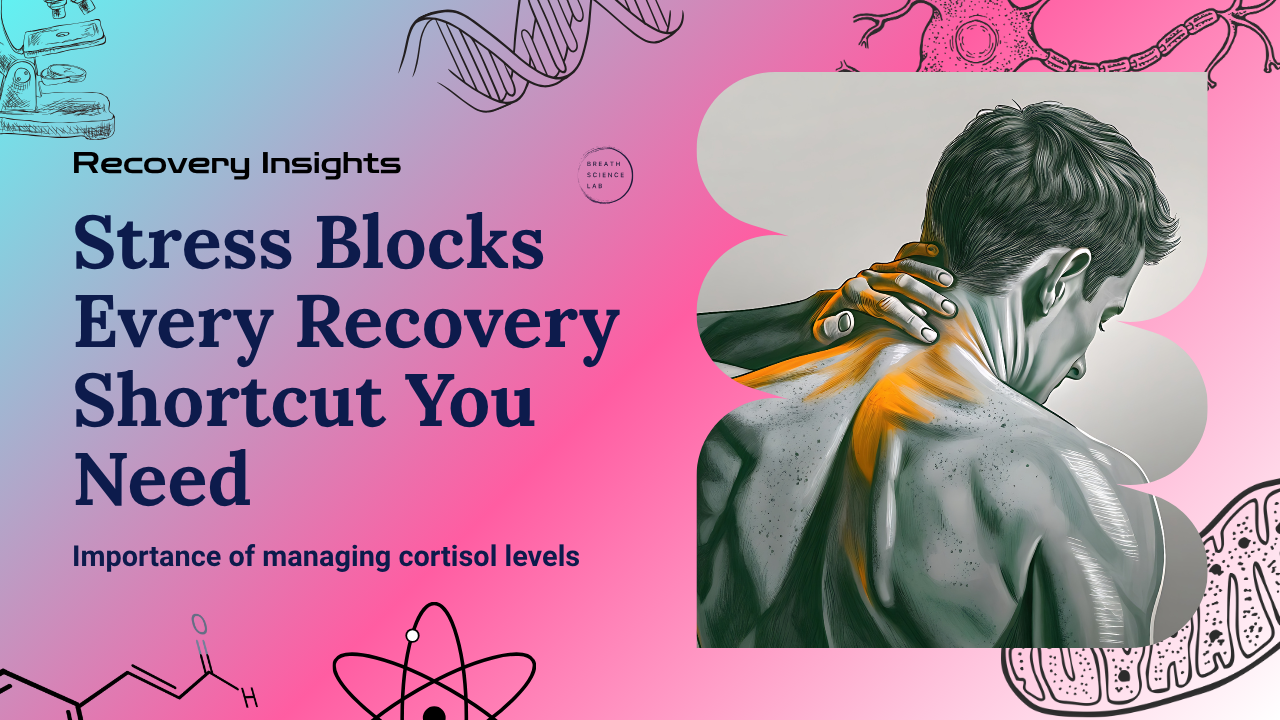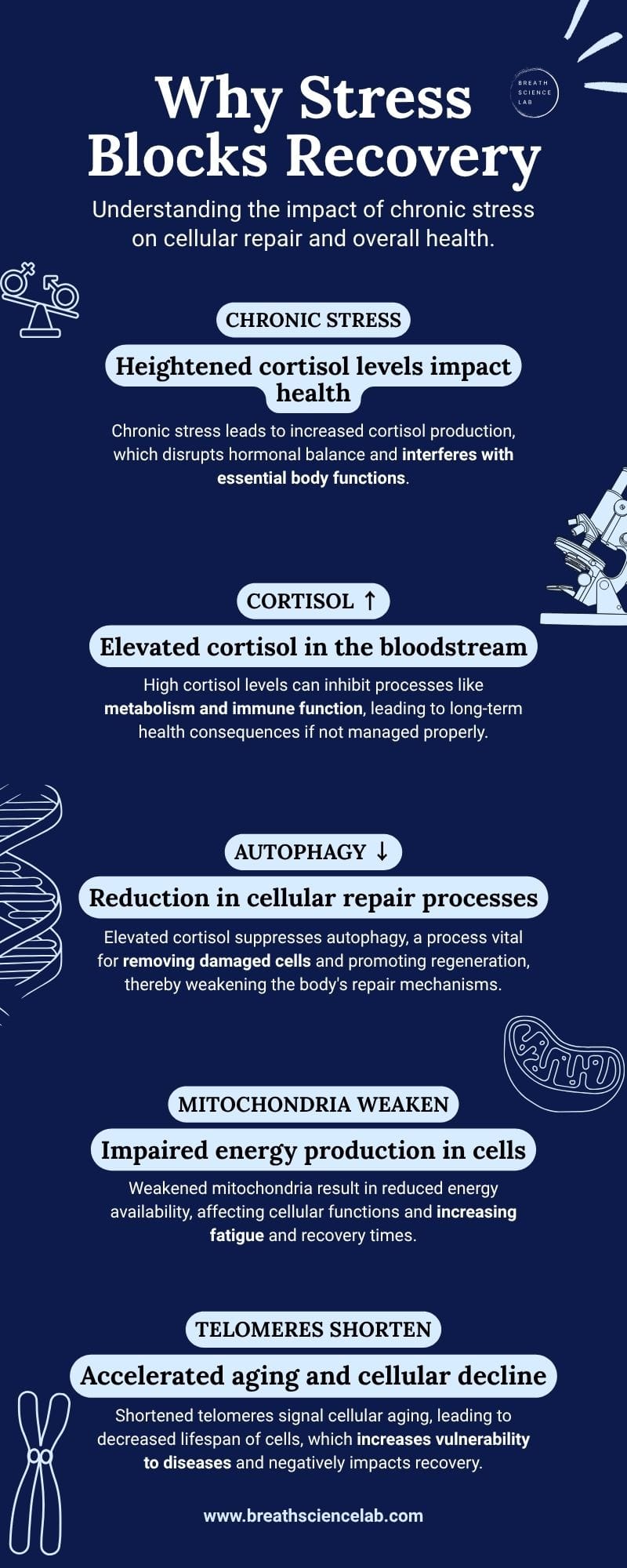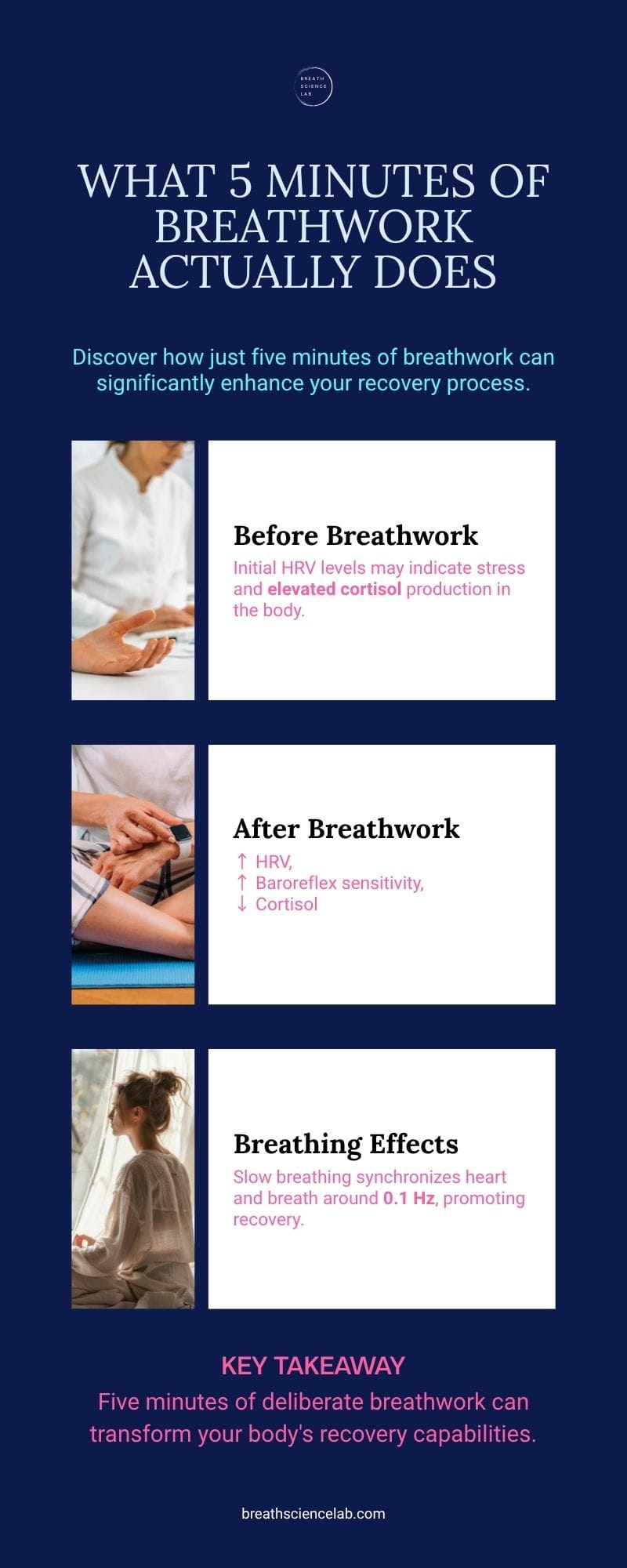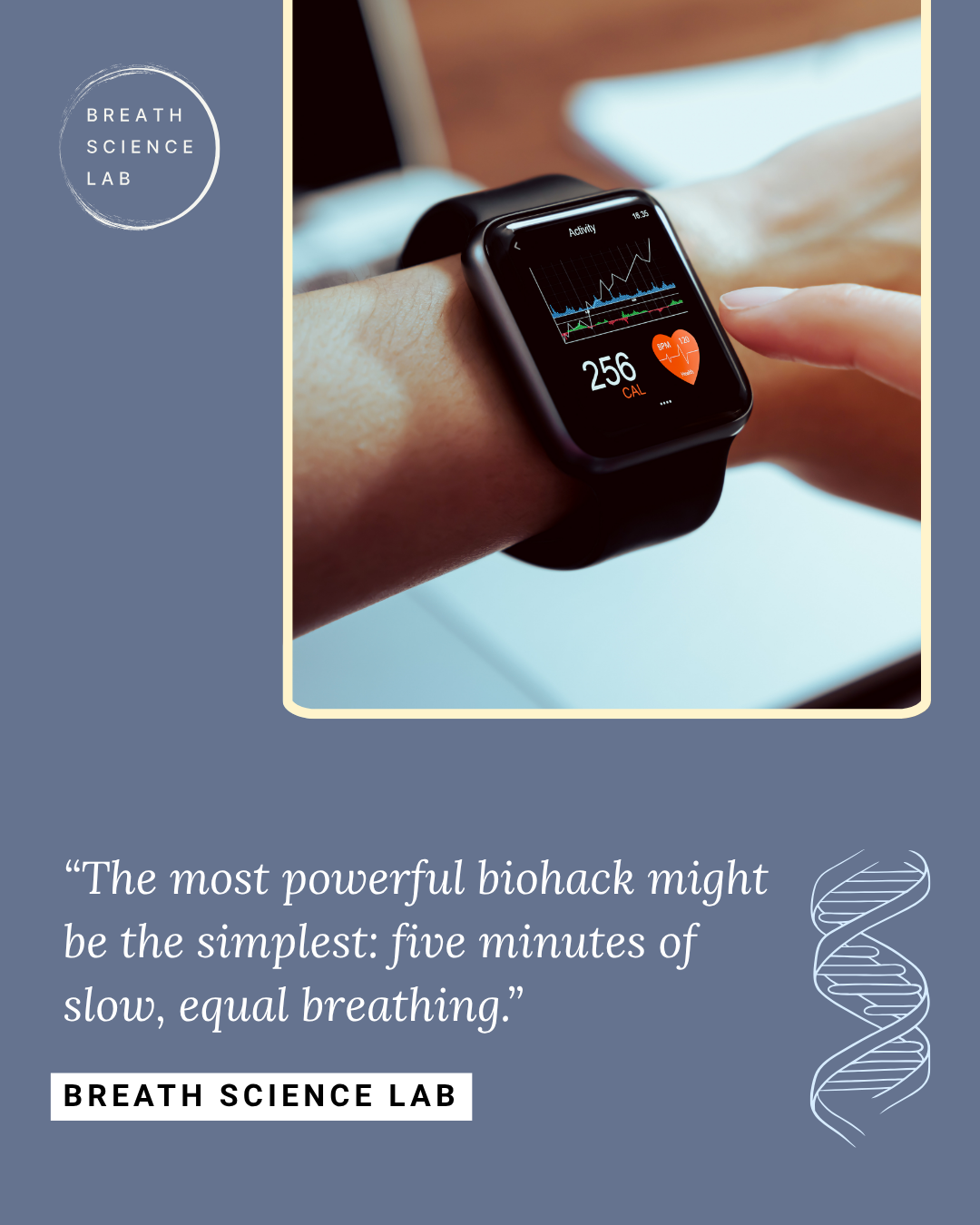Stress Blocks Every Recovery Shortcut

A few days ago, I was listening to one of my favourite biohackers, Dave Asprey, on YouTube. 20 minutes into the video on longevity biohacks, he said something that stopped me cold.
He'd been going through mitochondria upgrades, autophagy activation, and fasting protocols. The kind of optimization I have been obsessing over. Then he dropped this:
"High cortisol directly blocks autophagy. It also stops your body from fixing mitochondria, and it even makes your telomeres shorter...If you're caught in chronic stress, it doesn't matter if you follow my advice on fasting or if you go to the gym six days a week. Your body is in breakdown mode."
As I sat there in my car before going into work, I thought about every time I got a "Stressful Day" warning from my Garmin watch. It shocked me how important the ability to relax really is.
Why Stress Blocks Recovery
If you have chronic stress, your cortisol stays elevated, and your body is unable to do cellular cleanup that keeps you young.

What actually happens:
- Autophagy stalls (cells can't recycle damaged parts)
- Mitochondria weaken (energy production falls)
- Telomeres shorten (DNA literally ages faster)
- When your cortisol stays elevated, parasympathetic recovery shuts down - your vagus nerve can't do its job by signalling safety and repair.
It's why anyone can eat perfectly, optimize their sleep, fast for 18 hours, and still feel exhausted. The stress signal overrides everything!
Your nervous system treats chronic stress as danger. And when you are in danger, it's a matter of using energy for survival. It's just focused on getting you through the day without dying, not long-term repair.
Breathing to Restore Balance: The Missing Nervous System Reset
Asprey mentioned breathwork almost as an afterthought, just "five minutes of slow, deliberate breathing" for stress relief.
He didn't give specifics. But there's credible research on what actually works for nervous system reset, including breathwork protocols that shift the body out of fight-or-flight. Of course, I had to go down this rabbit hole.
I found a 2024 study that tested slow breathing at 5-6 breaths per minute in healthcare workers dealing with Long COVID, people with confirmed autonomic dysfunction. The researchers focused on measuring HRV and vascular reactivity to see if their bodies could still self-regulate.
At rest, only 19% of Long Covid workers showed normal vascular oscillation (Mayer waves), compared to 42% of never-infected workers. Their nervous systems weren't responding properly to stress.
Then they tested 5-minute breathwork using slow-paced breathing.
The Protocol That Signals Your Body It's Safe
The breathing pattern was specific: 5-6 breaths per minute using coherent breathing - equal inhale and exhale durations of 5-6 seconds each, with no holds or pauses. This creates a rhythm of approximately 0.1 Hz frequency, which synchronizes your cardiovascular system.
After only 5 minutes of this breath, 91% of Long COVID workers showed restored Mayer wave oscillations and vascular reactivity. This means their autonomic nervous system returned to normal regulation.
It wasn't a placebo. The researchers measured increases in vagally-mediated HRV parameters (RMSSD and low frequency power) in all groups, demonstrating real parasympathetic activation.
Why This Matters for Anyone Under Chronic Stress
It doesn't matter if you have Long COVID or not. The study found that all three groups of healthcare workers (even the ones never infected) showed HRV values "close to the lowest limits of normality under resting conditions".
Three years of high-stress work had suppressed everyone's baseline nervous system function.
And here is why slow breathing for stress relief is so powerful: It improves cardiovagal activity and baroreflex control by inducing a resonance frequency that generates and enhances respiratory sinus arrhythmia.
Basically, breathing at 5-6 breaths per minute creates a rhythm your heart and blood vessels naturally sync with. It unlocks your body's ability to self-regulate.
What 5-Minute Breathwork Actually Does for Recovery
When you breathe at this pace:
- Your heart rate naturally varies with each breath (respiratory sinus arrhythmia increases)
- Your vagus nerve signals parasympathetic recovery mode
- Your baroreflex, the system that stabilizes blood pressure, starts working correctly
- Your stress load is lowered, improving conditions for autophagy and repair
- By lowering stress load, conditions for autophagy and repair improve
- Your mitochondria can finally shift from survival to repair
What was concluded from this study is that "repeated sessions of slow breathing exercise may play an important role in restoring vascular impairment in these subjects and reducing long-term cardiovascular risk".
Not one session, but repeated practice. Like any training adaptation.

The Simple Protocol: Coherent Breathing at 5-6 Breaths Per Minute
Here is the exact protocol from research:
- Inhale smoothly through your nose for 5-6 seconds
- Exhale smoothly through your nose or mouth for 5-6 seconds
- No pauses or holds, keep the breath flowing continuously
- Repeat for 5 minutes
This gives you 5-6 complete breath cycles per minute. It will maximize HRV and baroreflex sensitivity.
Do this before bed, after stressful situations, or before workouts. No equipment or apps required. Just smooth, equal breathing.
However, if you want extra help and see real-time feedback, I recommend using the HeartMath app or their sensor with the app. It will show you that this actually works! You will see your HRV rise as you breathe! I personally love using this.
Note: If you choose to go with the HeartMath you will be supporting Breath Science Lab with a small commission at no extra cost to you.

The Realization About Longevity Biohacks
Watching that Dave Asprey video made me realize how important breathwork is for our longevity, and it's the foundation for everything else.
I track HRV. I take cold showers. I optimize mitochondrial function with supplements such as Fiseten and NMN. But if my nervous system is stuck in fight-or-flight from chronic stress, none of that creates the recovery I'm chasing.
The irony: the most powerful biohack might also be the simplest. Five minutes of coherent breathing at a specific rhythm. Zero cost. No subscription. Just the signal your body needs to switch from survival to repair mode.
The researchers noted this intervention has already proven effective for hypertension, COPD, and anxiety. It's not experimental. It's just underused.
Maybe the missing piece isn't another supplement. Maybe it's teaching your nervous system that it's safe enough to actually recover.
Safety Notes
This is gentle enough for most people, but:
- Don't force it; the breath should feel smooth and sustainable
- If you have respiratory conditions, check with your physician first
- This technique works best as a daily practice, not an emergency intervention
The study used this as regular training, not a one-time fix. Consistency beats intensity.
Try the 2-Minute Breath Quiz to find your safest starting pace and get a printable protocol you can use daily.

